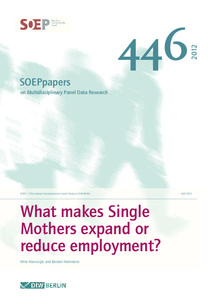What makes single mothers expand or reduce employment?

Hancioglu, Mine ; Hartmann, Bastian
Deutsches Institut für Wirtschaftsforschung, Berlin
DIW - Berlin
2012
22 p.
career development ; child care ; employment ; labour supply ; one parent family ; statistics ; women
SOEPpapers on Multidisciplinary Panel Data Research
446
Gender equality & Women
English
Bibliogr.
"To explore single mothers' labor market participation we analyze specific circumstances and dynamics in their life courses. We focus on the question which individual and institutional factors determine both professional advancement and professional descent. Due to dynamics in women's life course identifying and analyzing restrictions and interruptions of employment requires a longitudinal research design. The German Socio-Economic Panel (1984-2009) provides all necessary information identifying episodes of single motherhood and employment during life courses. Since family statuses of single mothers are partially endogenous and can end in multiple ways, we use semi-parametric survival models. Competing risks estimations offer a detailed view by analyzing single mothers' transition from not being employed to full-time or part-time work and vice versa simultaneously. Estimates show that occupational careers of single mothers are influenced by both individual factors and institutional circumstances. Whereas specific problems occur shortly after becoming a single mother, these problems seem to be dealt with over time. Enhancing labor market participation or maintaining full-time employment as a single mother can be achieved when certain challenges are met such as appointed and reliable working hours. Single mothers that do not have to rely on public childcare arrangements, but are capable of finding individual solutions are more likely to balance work and family life. Among institutional determinants welfare benefits have a negative effect on the market labor participation of women in low-paid jobs."
Digital
The ETUI is co-funded by the European Union. Views and opinions expressed are however those of the author(s) only and do not necessarily reflect those of the European Union or the ETUI.